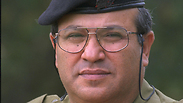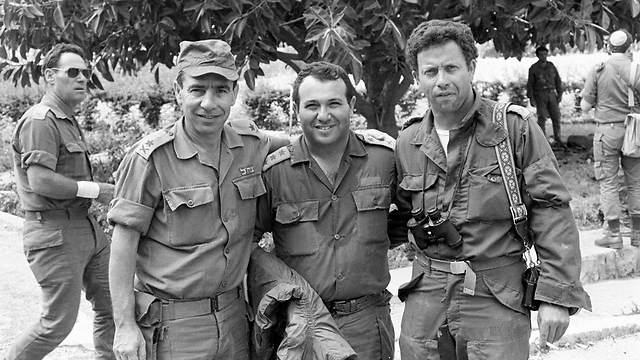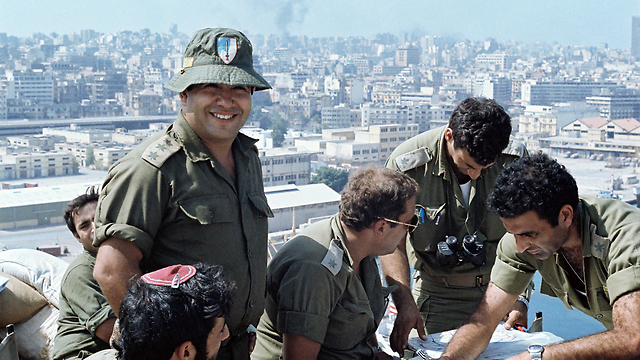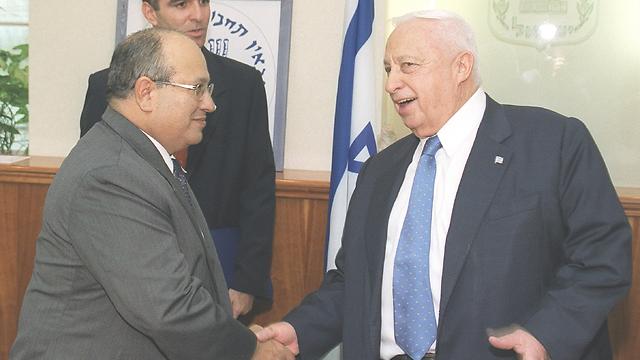
A fighter to the end: Meir Dagan's daring life
Former Mossad chief Meir Dagan died on Thursday morning at 71; his extraordinary life put him right in the center of Israeli history.
Late at night, a boat landed on the Gaza coast. A few soldiers dressed like Palestinians debarked. They presented themselves as terrorists who had been sent from Lebanon and asked to meet the head of the Popular Front for the Liberation of Palestine (PFLP) in the Gaza Strip. Someone brought them to him.
"We came for a work meeting," said the force's commander, and the leaders of the PFLP detailed the planned terror attacks to their guests. At a certain point, the commander signaled to his people that the time had come. The group whipped out their guns and eliminated the senior terrorist leaders in the Gaza Strip before they even knew what was happening.
This daring officer was named Meir Dagan. He was the commander of the Rimon Reconnaissance Unit, which operated against terrorism in the Gaza Strip at the beginning of the 70s. "It was a life that brought you to an extremely powerful level of experiences," he said in an interview to Yedioth Ahronoth years later, in which he revealed a small amount of the operations from that time. "But you get through it, because you know that you're serving the country."
And he served his country nearly all his life: as an officer in the Paratroopers Brigade in the Six-Day War; as the commander of Rimon, whose leg was injured when his jeep went over a mine, and he received a medal after jumping on a terrorist who was about to throw a grenade; as the commander of a special reconnaissance unit in the 143rd Division under Ariel Sharon during the Yom Kippur War; as the commander of 188th Armored Brigade in the First Lebanon War; as a major general in the IDF; and as the head of the Mossad, a position he held for eight years.
He survived all the wars, battles and operations, but not the fight against cancer.
Born on a train, raised in a transit camp
Meir Huberman (Dagan) was born in January 1945 on a train en route from Siberia to Poland, from where his parents had fled the Nazi threat a few years earlier. His maternal grandfather, Ber (Dov) Erlich (Sloshny), was murdered in the Holocaust. During his years at the head of the Mossad, Dagan kept in his office a picture of his grandfather kneeling before the Nazis, shortly before they shot him. Dagan's motto for his entire defense career was thus: there will be no second Holocaust.
At five years of age, he immigrated with his parents to Israel on board the refugee ship Galila. The family first lived in a transit camp, Machane Israel, not far from the Lod airport. They later settled in Bat Yam, where his parents ran a laundry service.
In 1963, he was drafted into the IDF and served in the Paratroopers' reconnaissance unit. Later, when asked where he grew up, he would answer, "in the army." That's also where he changed his name from Huberman to Dagan.
In November 1966, he was discharged from regular service at the rank of captain. During the Six-Day War, as a commander of a reserve company, he took part in battles in the Sinai, and, at the war's end, he was flown with his soldiers by helicopter to the Golan Heights, where he took part in its capture. Thirty-two years later, when he was a major general in reserves, and not yet the head of the Mossad, Dagan joined the campaign against a possible withdrawal from the Golan Heights.
After the Six-Day War, Dagan returned to regular service in the IDF, where he was an operations officer in the el-Arish region. In 1970, at the peak of the wave of terrorism in Gaza, the then-GOC Southern Command, Ariel Sharon, tasked Dagan with creating the Rimon unit. The unit's existence was a top secret, and the stories of the undercover agents that eliminated dozens of wanted terrorists in Gaza only began to surface years later. Former soldiers told of executions in cold blood, but Dagan denied those allegations.
"We always acted according to military standards," he said in one of his rare interviews. "The Rimon era was not the Wild West, where anyone could shoot anyone that he wanted to. Indeed, we never thought it permissible to eliminate women and children. But it's correct that the rules of engagement were different. There were fewer limitations."
In the same interview, Dagan said, "Nobody gets excited when the IDF sends a plane with six tons of bombs to drop on Hezbollah targets, and a few civilians get killed. However, if you send a unit to Gaza for a pinpoint elimination of three terrorists, the world is up in arms. Everyone shouts and throws a fit."

A short time after the unit's creation, Dagan was injured in both his legs after the jeep he was travelling in went over a landmine. He was hospitalized for half a year and returned to his unit with one of his legs still in a cast.
In January 1971, he was leading a patrol from the Jabalia refugee camp to Gaza City when he identified two terrorists in a taxi. One of them pulled out a grenade and was about to throw it at the unit. Dagan jumped out of his car and attacked the terrorist, warning his troops at the same time. After a short struggle, Dagan managed to gain control of the terrorist and prevent him from exploding the grenade. For his actions in the incident, he was awarded the Medal of Courage.
In the Yom Kippur War, Dagan fought on the southern front and was one of the first to cross the Suez Canal. Later, he made a career change and joined the Armored Corps, and during the First Lebanon War he was the commander of the 188th Armored Brigade. But even as an armored corps man, Dagan did not kick his habit of going undercover, and he travelled throughout Lebanon in local vehicles, while dressed as an Arab. "Even before my tank division went into Beirut, I already knew the city. I made secret visits there," he would tell.
After the war, he was appointed the commander of the IDF's Lebanon Liaison Unit and was among the founders of the South Lebanon Army (SLA). He also commanded over the 36th Division, was the IDF chief of staff's adviser on terrorism and the intifada, and in 1992 was appointed the head of the Operations Division. In 1993, he was promoted to the rank of major general as the assistant to the head of the Operations Directorate, but retired from the military two years later because he was not made a GOC.
He went on his post-military trip with his good friend Maj. Gen. (res.) Yossi Ben Hanan: They went on a jeep tour across half the world, which started in what used to be the Soviet Union, and parts of which were published in the media, including stunning photos from remote corners of the world. The adventurous trip was cut short, however, when Prime Minister Rabin was murdered.
Four months later, in the midst of a wave of suicide bombings, Dagan was called to serve as Ami Ayalon's deputy at the new counterterrorism unit, established by then-prime minister Shimon Peres.
When Benjamin Netanyahu was elected prime minister, Dagan was made the head of the counterterrorism unit, but resigned after the following elections that put Ehud Barak in the prime minister's seat. When asked at the time if he was interested in heading the Mossad or Shin Bet, he responded, "Nonsense. Believe me, I don't. Besides, the head of the Mossad and the head of the Shin Bet need to be younger people who view this role as the highlight of their lives. I want my small pleasures: to sit in my studio and sculpt."
Explosions and mysterious accidents
But a man like Dagan could not just sit at home. In 2000, he joined the Likud party, and during the 2001 elections, he served as the head of Ariel Sharon's campaign. When Sharon was elected prime minister, he established a secret mechanism to operate against terror organizations' financial sources and put Dagan at its head.
On September 10, 2002, Sharon surprised many when he announced Dagan's appointment as the head of the Mossad to replace Efraim Halevy. There was quite a lot of criticism in the defense establishment on the appointment of a man with a political background to such a role, but very quickly, the critics, too, realized that Dagan was the right man at the right time. His eight years at the head of the Mossad are considered particularly successful, during which he returned the Mossad to its former glory.

Early in his tenure, Dagan announced that from that point onwards, the Mossad would mostly deal with two issues: the Iranian nuclear program, and terrorism outside Israel's borders. We have limited resources, he said. We're not the United States. If we keep claiming we can do everything, we'll end up doing nothing.
Quite a few senior terrorists died during that time in different and peculiar ways. Among them was Hezbollah's military chief, Imad Mughniyeh, who was assassinated in Damascus on February 12, 2008; senior Hamas official Mahmoud Al-Mabhouh, who was assassinated at a hotel in Dubai on January 19, 2010; and Hamas's "treasurer" Izz El-Deen Sheikh Khalil, who was assassinated in Damascus on September 25, 2004. Quite a few Iranian nuclear scientists were also killed in mysterious accidents. Israel has never claimed responsibility for these actions, but foreign sources attributed them to the Mossad, under Dagan's command.
Also among the achievements attributed to the Mossad during that time (again, according to foreign sources) were repeated operations of sabotage of the Iranian nuclear project, explosions at Hezbollah weapons caches in Lebanon, thwarting the organization's revenge operations over Mughniyeh's assassination, finding Iranian arms ships, the exposure of the Syrian reactor, and a long list of operations that would remain top secret for years to come.
"Dagan came with the mindset of a tank battalion commander that needs to conquer a hill," said a former Mossad official. "It's clear that not all the tanks will arrive, and it's clear that the tanks will run over some of the best soldiers, and clearly there will be glitches and an exchange of fire, but for him, as long as the tanks thundered onward and attained the target at the end, it didn't matter."
But even Dagan, the fearless warrior, was aware of the limitations of power. Already during his tenure as the head of the Mossad, he fought against Prime Minister Netanyahu and then-defense minister Barak's plan to attack Iran's nuclear facilities.
"If we attack today," Dagan said, "not only will we not stop the bomb, but also create a reality in which we are solving all of the internal political problems in Iran by causing the population to stand as one behind the regime." He claimed that economic sanctions would be more effective than a military move and that Israel must continue delaying the Iranian nuclear program with ruses.
Dagan was even quoted as saying that he was very concerned that after he leaves his role at the head of the Mossad, there would be no one to stop Netanyahu and Barak from going on "dangerous adventures." These comments led to harsh criticism from Netanyahu and his close associates, who accused him of trying to mount a putsch against a sitting prime minister and of causing serious damage to Israel's security. Dagan vehemently rejected the accusations, and at one opportunity said, "Had I received an order to attack Iran today, even if it contradicted my views—I'd do it." But in another interview that he gave after his retirement, he said that if he had received an order to attack in Iran, he would have immediately submitted his resignation.
After his retirement, his strong objection to a military attack on Iran turned into harsh criticism of Netanyahu's policies on all issues. In a speech he gave at Rabin Square on the eve of the last elections, Dagan said, "Israel is surrounded by enemies. They don't scare me. I'm afraid of our leadership. I fear the lack of vision, the lack of direction and determination, and a dearth of exemplary leadership. I fear hesitation and stagnation. I fear—above all—a crisis of leadership. This is the most serious crisis I can remember since the creation of the state."
Later in his speech, Dagan addressed Netanyahu, saying, "Where are you heading, Mr. Prime Minister? Why would you want to be responsible for our fate if you're afraid to take responsibility? Why would a man seek leadership if he doesn't want to lead? We have a leader who is fighting only one campaign: a war for his own political survival."
Netanyahu and other Likud officials claimed Dagan's criticism derived from the fact that his tenure as the Mossad chief was not extended as he had asked, but Dagan revealed a letter he wrote to Netanyahu in September of 2010, in which he asked the prime minister to end his tenure at the planned date.
Despite the fact he was one of his biggest critics, Dagan was consulted by Prime Minister Netanyahu on whom to appoint as the next Mossad chief, and Dagan warmly recommended Yossi Cohen.
Ups and downs
In 2012, Dagan was diagnosed with liver cancer. He started undergoing aggressive chemotherapy, but his disease kept progressing until he suffered liver failure. Dagan, who was 67 years old, did not meet the criteria for a liver transplant in Israel, which determined that those over the age of 65 cannot be entered the waiting list for transplant. But thanks to the intervention of then-foreign minister Avigdor Lieberman, then-president Shimon Peres and Prime Minister Netanyahu, Belarus' President Alexander Lukashenko agreed to allow Dagan to undergo a liver transplant at a hospital in Minsk.

"I started tying up my life, saying goodbye to people," Dagan said upon his return to Israel. "It was a painful process but then, with the aid of quite a few people, I received a liver donation that saved my life. For how long, I don’t know, but it's clear to me that if I hadn't received that liver donation, I would not be alive."
Dagan's rehabilitation after the operation was impressive. He gained weight and started resuming business activity and traveling the world. But at a certain point the cancer returned, and spread to his lungs.
In the last few months of his life, Dagan's medical condition gravely deteriorated. He was in and out of Ichilov Hospital in Tel Aviv. Despite that, he insisted on displaying optimism. "I'm fine, I'm fine," he told his loved ones. The worst they would hear from him was the sentence, "Life has its ups and downs—and today is a down day."
On Thursday morning, Dagan passed away at the age of 71, leading behind his wife, Bina, three children, and seven grandchildren.
Efraim Halevy, who was the Mossad chief before Dagan, said: "I met Meir recently at all kinds of gatherings with friends, and he showed tremendous interest in the Mossad's operations, even after his retirement. He didn't speak of his medical condition; it was clear his condition was unwell and that he was bravely fighting the disease. I'll remember him as a very humorous man. I'll remember him as someone who stood out in everything he did and committed daring acts beyond the horizon. People like him ensured the existence of the State of Israel."











